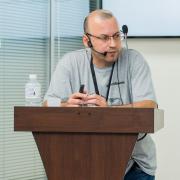PGConf.Online 2021
PGConf.Russia is a leading Russian PostgreSQL international conference, annually taking together more than 700 PostgreSQL professionals from Russia and other countries — core and software developers, DBAs and IT-managers. This will be the first experience PGConf.Online
Thems
- PostgreSQL at the cutting edge of technology: big data, internet of things, blockchain
- New features in PostgreSQL and around: PostgreSQL ecosystem development
- PostgreSQL in business software applications: system architecture, migration issues and operating experience
- Integration of PostgreSQL to 1C, GIS and other software application systems.
Talks
Talks archive
-
 Alexey Fadeev Sibedge
Alexey Fadeev SibedgeMulticorn technology allows you to develop FDWs in Python, which is much easier and faster than creating FDWs in C. However, there is a downside, Multicorn FDWs work well with primitive WHERE conditions, but more complex cases cause difficulties, which I will talk about. Cases will be considered on the example of my Multicorn FDW for getting OpenStreetMap data. I will also show examples of using the same code in Multicorn FDW and plpython functions, including performance comparison. In conclusion, I will share my findings on when it is better to use plpython, and when Multicorn FDW is more preferable.
-
 Yugo Nagata SRA OSS, Inc. Japan
Yugo Nagata SRA OSS, Inc. JapanMaterialized view is a feature to store the results of view definition queries in DB in order to achieve faster query response. However, the data in the view gets stale after underlying tables are modified. Therefore, view maintenance is needed to keep the contents up to date. PostgreSQL has REFRESH MATERIALIZED VIEW command for updating a materialized view, but this command needs to recompute the contents from scratch, so this is not efficient in cases where only a small part of a base table is modified.
Incremental View Maintenance (IVM) is a technique to maintain materialized views efficiently, which computes and applies only the incremental changes to the materialized views instead of recomputing. This feature is required for updating materialized views rapidly but not implemented on PostgreSQL yet.
Therefore, we developed IVM on PostgreSQL and are proposing to implement this as a core feature. The patch is now under discussion on the hackers mailing list. Our implementation allows materialized views to be updated automatically and incrementally when a underlying table is modified. You don't need to write your own trigger function for updating views. As a result of continuous development, the current implementation supports some aggregates, subqueries, self-join, outer joins, and CTEs (WITH clauses) in a view definition query. The result of performance evaluation using TPC-H queries shows that our IVM implementation can update a materialized view more than 200 times faster than re-computation by REFRESH command.
In this talk, we will describe our IVM implementation and its features.
-
 Igor Kosenkov PostgresPro
Igor Kosenkov PostgresProSome OS distributions do not have a pcs configuration utility to create a high availability cluster PostgreSQL. In this case, the crm utility from the crmsh package will help us. It is more difficult to use, but powerful and effective.
In my master class, I will show how to use this utility, as well as configure a failover cluster in different configurations.
-
 Ivan Panchenko PostgresPro
Ivan Panchenko PostgresProIn this talk, you'll learn about Postgres Pro DBMS from the co-founder of Postgres Professional. Ivan will explain the philosophy behind this enhanced variant of PostgreSQL, reveal the differences between Postgres and Postgres Pro and provide the roadmap for the further evolution of Postgres Pro DBMS.